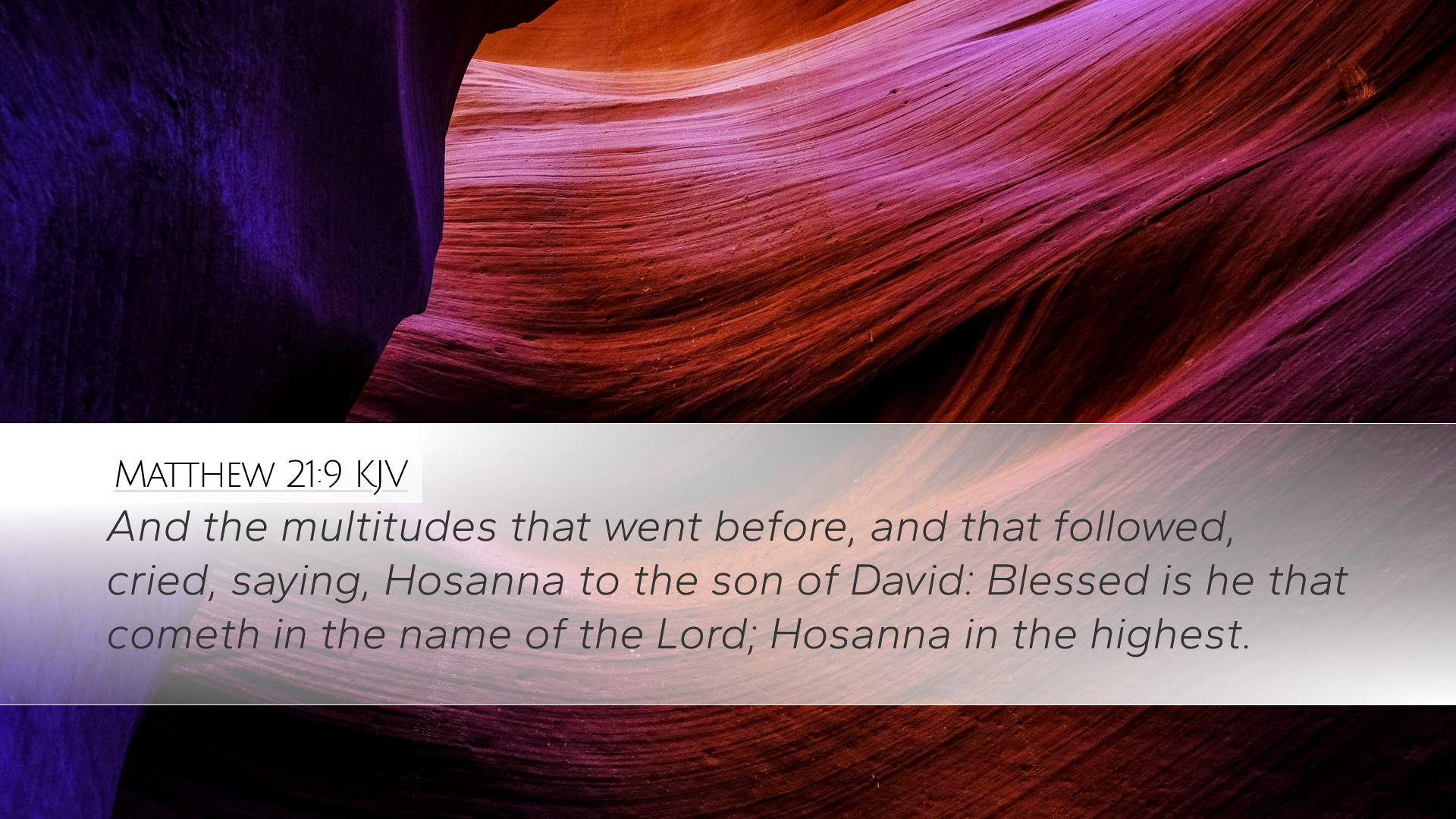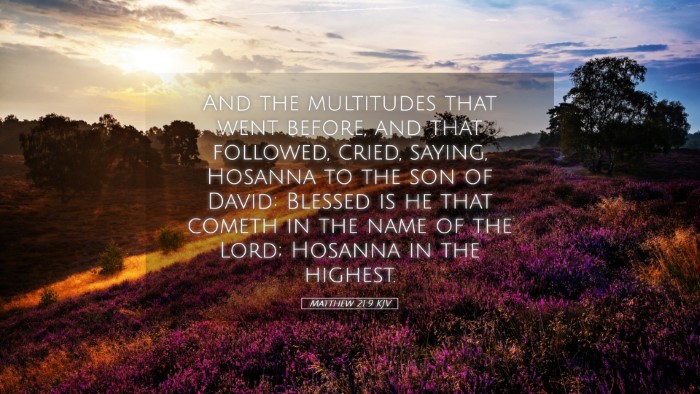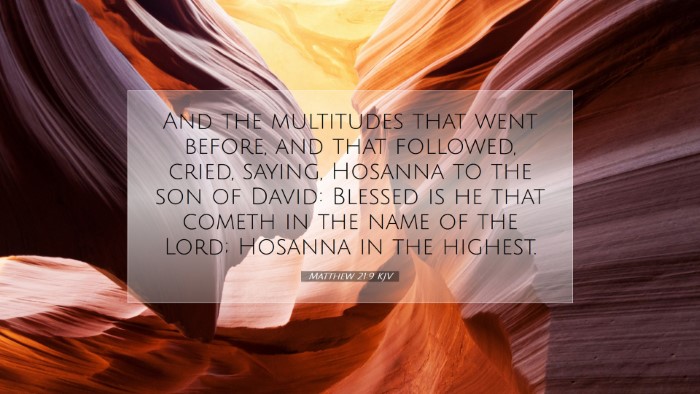Matthew 21:9 - Bible Commentary
Verse: And the multitudes that went before, and that followed, cried, saying, Hosanna to the Son of David: Blessed is he that cometh in the name of the Lord; Hosanna in the highest.
Introduction
This verse captures a pivotal moment in the New Testament, known as the Triumphal Entry of Jesus into Jerusalem. It marks the beginning of the final week of Jesus’ earthly ministry leading up to His crucifixion. The praises and acclamations of the crowd provide profound insight into the expectations surrounding Jesus as the Messiah.
Historical Context
The entry of Jesus into Jerusalem depicted in Matthew 21:9 occurs in the context of the Jewish Passover, when pilgrims were arriving in mass to celebrate a significant feast. The Messianic fervor among the Jewish people was heightened, and the expectation of deliverance was palpable.
- Matthew Henry Commentary: Henry notes that the crowd's reaction reflects their belief in Jesus' messianic role, aligning with prophetic tradition.
- Albert Barnes Commentary: Barnes elaborates that the term "Son of David" emphasizes Jesus' royal lineage, a key aspect of messianic identity in Jewish thought.
- Adam Clarke Commentary: Clarke highlights that the people's response can be interpreted as a mix of genuine adoration and misguided expectations.
Analysis of Key Phrases
"Hosanna to the Son of David"
This phrase embodies a plea for salvation as well as an acknowledgment of royal lineage. The word "Hosanna" is rooted in Hebrew, meaning "save now." This acclamation reflects the anticipation that Jesus is the promised Messiah destined to liberate the people.
- Matthew Henry: Emphasizes the recognition of Jesus' authority and the messianic nature embedded in the title "Son of David."
- Albert Barnes: Suggests that the people's use of "Hosanna" indicates their desire for immediate political deliverance from Roman oppression.
- Adam Clarke: Points out that this moment symbolizes a bittersweet acknowledgment of Jesus’ divinity intertwined with human misunderstanding.
"Blessed is he that cometh in the name of the Lord"
This phrase is a direct reference from Psalm 118:26, often recited during festivals. By proclaiming this, the crowd affirms Jesus’ authority and mission, associating Him with divine blessings and legitimacy.
- Matthew Henry: Highlights the prophetic significance of this proclamation, underlining the divine plan that Jesus fulfills.
- Albert Barnes: Notes that this is an acknowledgment of Jesus as a messenger from God, reinforcing the credibility of His ministry.
- Adam Clarke: Analyzes the celebratory tone of the crowd as indicative of their hope, albeit complicated by their misconceptions of His mission.
"Hosanna in the highest"
This concluding exclamation indicates a call for heavenly praise and glorification of Jesus as well as an acknowledgement of His divine status. It calls back to images of heavenly processes, reinforcing the worship due to God alone.
- Matthew Henry: Suggests that this phrase suggests a heavenly acknowledgment of Jesus’ reign and authority.
- Albert Barnes: Interprets this as both a plea and a proclamation, reflecting the people’s desire for Jesus’ reign to extend to the heavens.
- Adam Clarke: Points out the dual nature of this acclamation as celebration mixed with urgent craving for divine intervention.
Theological Implications
The passage’s core invites analysis regarding the nature of Jesus’ kingship and how it transcends immediate political expectations. His entry, marked by humility rather than the anticipated military might of a king, reflects the paradox of the Kingdom of God.
- Matthew Henry: Observes that true kingship lies in service and suffering, themes that resonate throughout Jesus' ministry.
- Albert Barnes: Discusses the concept of a spiritual kingdom, contrasting the expectations of an earthly monarchy.
- Adam Clarke: Encourages a reflection on the nature of faith and understanding amid the complexities of divine purpose.
Application for Today
This verse invites contemporary readers to consider their own expectations of Jesus. In today's context, believers are encouraged to reflect on the nature of their praise. Are they seeking a savior for their immediate desires, or are they recognizing the greater spiritual salvation offered through Christ?
- Pastoral Reflection: Clergy can use this passage to inspire congregants to seek deeper understanding of Jesus’ nature and the mission of the Church.
- For Students: This commentary serves as a vital resource for examining the interplay between biblical prophecy and fulfillment.
- Theological Insight: Scholars can derive significant lessons on the expectations of the Messiah and their fulfillment in Jesus, providing a foundation for modern teachings on discipleship.
Conclusion
Matthew 21:9 serves as a powerful reminder of the juxtaposition between human expectation and divine purpose. The exuberance of the crowd encapsulates a profound yearning for salvation that is ultimately fulfilled in unexpected ways. The challenge remains for each generation to align their understanding and worship of Jesus with His true mission as revealed in Scripture.


